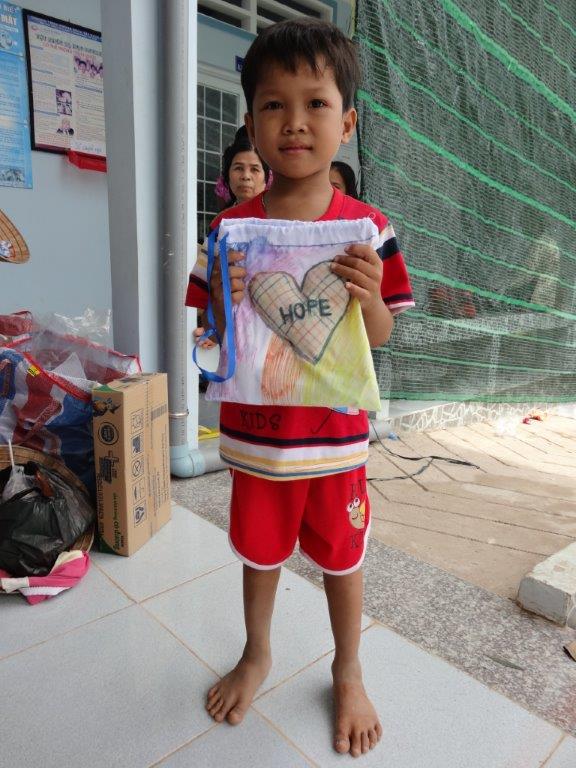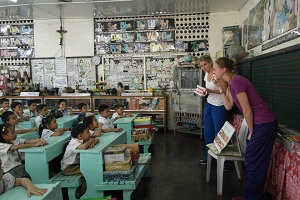 In this article Sharon shares her time volunteering with the Christian Health Aid Team in 2013 and explains how others can get on board.
In this article Sharon shares her time volunteering with the Christian Health Aid Team in 2013 and explains how others can get on board.
Living in a developed country such as Australia, it is easy to become sheltered from the harsh conditions and realities many children encounter every day in countries such as Vietnam, Congo and Ethiopia. In December 2013, I was fortunate enough to (as part of my undergraduate dental student training) join the Christian Health Aid Team (CHAT) and go to Vietnam to provide dental treatment in underprivileged and remote areas.
The Christian Health Aid Team
For those unfamiliar with CHAT and its services, I’d like to outline a few key things about the organisation and my experiences whilst volunteering abroad.
CHAT is a non-profit organisation founded by Dr David Booth, a well- known and respected oral maxillofacial surgeon and oral pathologist in Western Australia. It was designed to address the lack of access to medical and dental services in the majority of Vietnamese people, particularly children. CHAT organises four trips each year. Each CHAT trip typically includes five dentists, two final year dental students, five dental assistants, one medical doctor, one handyman, two interpreters and a local Vietnamese helper to navigate/translate/troubleshoot.
My time in Vietnam
As part of the Bachelor of Dental Science course in the University of Western Australia, students are allowed to choose two options for their placements. One of these options was travelling to Vietnam with the CHAT team. For my particular placement, I went from the 30th November 2013 to the 7th December 2013 to Kon Tum, an area close to Laos and Cambodia, in the Central Highlands region of Vietnam. The trip involves seven days, five of which are for providing dental treatment.
Days one and two involve loading and organising the dental equipment and travelling from our central headquarter in District 10, Ho Chi Minh City to our remote location. Naturally, day seven involves unloading and repacking all dental equipment back into central headquarters.
This was my first time in Vietnam and what an exciting place it was. There was always something to see, touch and taste. I particularly always felt invincible when I successfully crossed a road full of oncoming motorbikes. This is no easy feat when you usually have to move forward whilst ducking and weaving between motorbikes from both sides of the road.
Once all the housekeeping issues were complete, the fun began. Since most locations were remote, we always woke early to accommodate the half hour to 1½ hours travel time. Luckily, I was with a fantastic, fun loving team and each rocky bump on the road was met with laughter and the occasional song.
The first location we visited was a hospital in Kon Tum and the second location a childrens' school. A usual day begins with setting up of the clinical space, laying out the instruments, organising the portable hand pieces and setting up the sterilisation area. On our first day of treatment, (seeing as it was our first time working together), there were a few "Ooh, excuse me's as everyone tried to navigate around each other. However, by the end of the trip, we resembled a factory production line. It really was like a dental version of pass the parcel. Once set up is complete, the medical doctor begins examining the children“ taking blood pressure and screening for medical complications that may require antibiotic prophylaxis. Once medical approval and oral hygiene instruction are given, our CHAT leader then triages each patient. Each child is then allocated a dental chart with a suggested treatment outline and directed into a queue for dental treatment.

Before coming to location, I had been advised by the senior dentists to "forget everything you have ever learnt about ideal treatment". After just one morning of work, I understood. Here, treatment options consist only of direct restorations or extractions. Glass Ionomer cements were usually the material of choice, the occasional amalgam was performed and in very rare cases, composite. A typical situation involves your dental assistant shining a torch into a child's mouth, caries excavation with a slow speed, high speed or a spoon excavator (whichever instrument you were able to safely use in the child's mouth), all the while cradling a struggling child in your arms and repeating the word "yoy" - good in Vietnamese.
I have to admit I felt secretly blessed that the main restorative material we had was glass Ionomer cement. It was so forgiving in a wet, screaming mouth and so easy to mould with the press of a finger. For a dental student, it was also a treasure chest of extraction experience. However, as exciting as this was, it was also met with an apprehension of extractions over restoration. Fortunately for my conscience, I soon saw that the children were much happier without their dental pain and that if left untreated, an abscess could develop and affect the adult teeth. Additionally, since we are the only dental exposure these children may have for a very long time, it is usually better to extract the tooth.
Day Four and Five
Days four and five involved visiting the Leprosy centre and providing appropriate dental treatment. It is a general consensus that the working conditions encountered during CHAT trips are usually hot, sweaty and quite unpleasant. However, each location we went to was blessed with cool winds, water and electricity access and bright lights. Additionally, since each allocated treatment area was large, set up was nicely spaced out and it made working from 8am-4pm much easier. In total, we saw 637 patients in five days. Not bad for a group of 15!
Summary
Volunteering with CHAT is an amazing experience and one I would whole-heartedly recommend. The lessons and experience I gained in extraction, diagnosis, triage and patient management have been so useful. The inclusion of having a medical doctor and senior dentists on the team also meant instant communication regarding any medical conditions or difficult cases; a blessing I was grateful for as a student. I strongly urge others to consider volunteering with the CHAT team to help those less fortunate, gain insight into our improved living environment, gain experience/confidence in your dental treatment and experience a once in a lifetime adventure. I have met so many people and formed such great friendships that I truly look back at my time with fondness.
Please note that only qualified dentists and final year dental students (under supervision) are allowed to treat patients. However, other lower year dental students are welcome to volunteer and take on the role of a dental clinic assistant. Also, CHAT trips are self-funded and all volunteers are required to pay for their flights, accommodation and travel visa.
Volunteer
If anyone is interested but unable to come along to the Vietnam trips, the CHAT team are always looking for donations of dental supplies. This includes local anaesthetic, hand pieces, glass Ionomer cement, and amalgams.

The team also prepares gift bags for all the children we visit, thus any donations of toothbrushes, colour pencils, notepads would be appreciated. We ask for no donations of toothpaste, as the children prefer the taste of their local toothpaste brand. For those who enjoy a little art and craft, help is also welcome with assembly of the calico gift bags or to knit soft toys for the children. Monetary donations are also welcome and rest assured that every cent does go to the children and their careers in Vietnam.
Further information can be found in the website www.chatinc.org.au and by contacting the CHAT secretary (Lyn Santich) at [email protected].
Sharon Fan